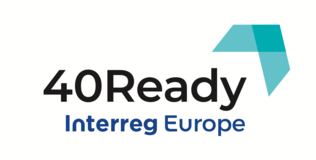Within the 40Ready context, OIR POSDRU Bucharest-Ilfov launched the "Report on public policies on the digitization of SMEs identified to be improved and examples of good local practice" in order to take a picture of the Romanian current situation as for the topics within Industry 4.0.
This report was built following some main steps:
- Global, regional and national context on the digitalisation of SMEs
- The need to develop digital skills
- Digital maturity of SMEs in Romania
- Analysis of public policies aimed at digitizing SMEs
- Good practices on public policies that support the digitization of SMEs
- Other public policies for the digitization of SMEs that can be developed or improved
According to the report, the digital economy is a global economy that supports intangible products (for instance, information, processes, platforms) and is intensely interconnected. Technologies such as IoT, 5G, Big Data, Blockchain and Artificial Intelligence help companies achieve greater supply chain flexibility, help increase data security and strengthen remote work capabilities and process automation. Studies to quantify the impact of digitalisation on SMEs show an average revenue increase of 25% and an average cost reduction of 22%.
According to the report of the European Commission Small Business Act Factsheet 2019 for Romania, SMEs represent 99.7% of companies in the economy and employ 66% of employees. That is why it is essential that the digitization of these companies be guided, supported, coordinated. The national programs also had a digitization component. Whether we are talking about Start-Up Nation or ROP Axis 2 regional programs, they are a source of funding for SME digitization projects.
There is a great need for digitalization of SMEs in Romania, in the context in which the report of the Index of the Digital Economy and Society (DESI) in 2020 shows that Romania ranks 11th out of 28 in terms of connectivity.
Regarding the digital maturity of Romanian SMEs, the White Paper on Romanian SMEs shows that the main elements used by Romanian SMEs are the computer (89.93%), e-mail applications (88.14%), internet (88.14%), intranet (50.61%), social networks (43.10%), the company's own website (34.62%), online sales/purchases transactions (7.51% ).
The report continues with the analysis of public policies in the European context and in the national context. The Digital Europe program aims to improve the EU's international competitiveness by supporting the development of key areas such as:
- Artificial intelligence
- High-Performance Numerical Calculation (HPNC)
- Cybersecurity
- Advanced digital skills
- Digitization of public administration and interoperability
The role of European Digital Innovation Hubs (EDIH) is to ensure that innovative digital solutions, based on new technologies, are integrated into the day-to-day business of companies and public administrations.
Government Decision no. 89/2020 of 28.01.2020 provides for the organization and functioning of a new body, the Romanian Digitalization Authority (ADR). ADR takes over the activities and structures of the Ministry of Communications and Information Society related to the fields of information technology, information society and the national interoperability framework.
Next, the report reviews the existing operational programs at national level: the Operational Program Competitiveness 2014-2020 (POC) and the Operational Program Human Capital 2014-2020 (POCU).
OIR POSDRU then continues the analysis of public policies with minimal aids, Digital Innovation Hubs, SIPOCA 18 and 20, National Investment and Economic Recovery Plan, National Plan for Economic Recovery and Resilience, SME Growth Program in Romania, Innovation Checks.
Examples of good public policy practices and other public policy proposals that can be developed or improved are then mentioned.
More information about the project can access directly from the OIR POSDRU Bucharest-Ilfov website.
The report in English version is made available here.












